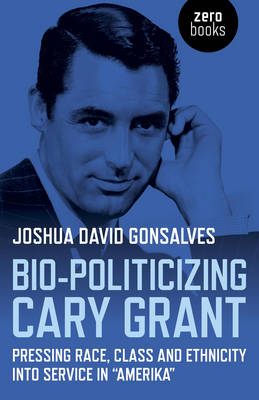
Bio–Politicizing Cary Grant – Pressing Race, Class and Ethnicity into Service in â Amerikaâ
Seiten
2015
Zero Books (Verlag)
978-1-78279-771-5 (ISBN)
Zero Books (Verlag)
978-1-78279-771-5 (ISBN)
- Titel z.Zt. nicht lieferbar
- Portofrei ab CHF 40
- Auch auf Rechnung
- Artikel merken
Bio-Politicizing Cary Grant explicates the ethnic, racial and sexual ambiguity of Cary Grant's star persona as both an inculcation of (and resistance to) biopolitical imperatives in fifties-era "America".
Who will Cary Grant have been when the future runs out? In the atrocity-rich wake of Hiroshima, Cold War America is enriched beyond belief. Hollywood radiates, in turn, images of a consumer utopia criss-crossed by segregation, social mobility, racial passing, anxieties about ethnicity and "white panic". Cary Grant's class-less classiness seems to denote this (sub)urban leisure class without an effort, yet he signifies more than this: ambivalent, bi-sex'd, inter-sected by the biopolitics of racialization, the policing of sexual agency and stereotypical ethnic identifications (including the invisible Anglo instanced by the high-angle shot). If biopolitics signifies the individuated control of populations, Bio-Politicizing Cary Grant: Pressing Race, Class and Ethnicity into Service in Amerika locates this anxious racialization of service persons, interracial sexuality and social mobility (passing) in an Americanized simulacrum of the Mediterranean world in To Catch a Thief (1955) and in a New York/Northeast-centered USA in North by Northwest (1959). Bio-Politicizing Cary Grant queries the criticism of Alfred J.
Hitchcock's films so as to historically situate one of the first free agents in Hollywood. Yet this semblance of freedom pays a price in meat, murder, massification and the organized homicide of Cold War geopolitics. The book explicates, in sum, the ethnic, racial and sexual ambiguity of Cary Grant's star persona as both an inculcation of (and resistance to) biopolitical imperatives in fifties-era "America".
Who will Cary Grant have been when the future runs out? In the atrocity-rich wake of Hiroshima, Cold War America is enriched beyond belief. Hollywood radiates, in turn, images of a consumer utopia criss-crossed by segregation, social mobility, racial passing, anxieties about ethnicity and "white panic". Cary Grant's class-less classiness seems to denote this (sub)urban leisure class without an effort, yet he signifies more than this: ambivalent, bi-sex'd, inter-sected by the biopolitics of racialization, the policing of sexual agency and stereotypical ethnic identifications (including the invisible Anglo instanced by the high-angle shot). If biopolitics signifies the individuated control of populations, Bio-Politicizing Cary Grant: Pressing Race, Class and Ethnicity into Service in Amerika locates this anxious racialization of service persons, interracial sexuality and social mobility (passing) in an Americanized simulacrum of the Mediterranean world in To Catch a Thief (1955) and in a New York/Northeast-centered USA in North by Northwest (1959). Bio-Politicizing Cary Grant queries the criticism of Alfred J.
Hitchcock's films so as to historically situate one of the first free agents in Hollywood. Yet this semblance of freedom pays a price in meat, murder, massification and the organized homicide of Cold War geopolitics. The book explicates, in sum, the ethnic, racial and sexual ambiguity of Cary Grant's star persona as both an inculcation of (and resistance to) biopolitical imperatives in fifties-era "America".
Joshua David Gonsalves is an Assistant Professor in the English Department at the American University of Beirut, where he teaches Romanticism, War and Cinema Studies. He has published on Romantic-era Geo/Bio-politics, Speculative Realism and David Lynch's Inland Empire (2006) in David Lynch in Theory (2010).
| Erscheint lt. Verlag | 27.2.2015 |
|---|---|
| Sprache | englisch |
| Maße | 140 x 216 mm |
| Gewicht | 114 g |
| Themenwelt | Geisteswissenschaften ► Geschichte ► Regional- / Ländergeschichte |
| Geschichte ► Teilgebiete der Geschichte ► Kulturgeschichte | |
| Sozialwissenschaften ► Soziologie ► Makrosoziologie | |
| ISBN-10 | 1-78279-771-8 / 1782797718 |
| ISBN-13 | 978-1-78279-771-5 / 9781782797715 |
| Zustand | Neuware |
| Haben Sie eine Frage zum Produkt? |
Mehr entdecken
aus dem Bereich
aus dem Bereich
der stille Abschied vom bäuerlichen Leben in Deutschland
Buch | Hardcover (2023)
C.H.Beck (Verlag)
CHF 32,15
vom Mittelalter bis zur Gegenwart
Buch | Softcover (2024)
C.H.Beck (Verlag)
CHF 16,80
eine Geschichte der Welt in 99 Obsessionen
Buch | Hardcover (2023)
Klett-Cotta (Verlag)
CHF 34,90


